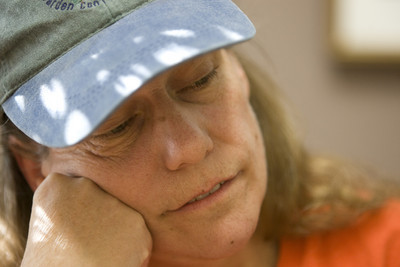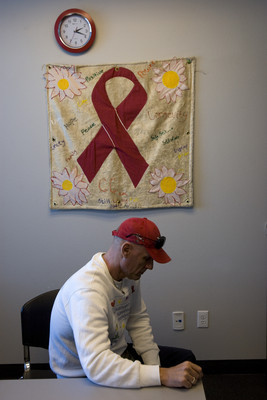Local HIV/AIDS patients are losing array of support services
Trust, 43-year-old Maryanne Beitz says, doesn't come easy to her.
That's not surprising, considering how she ended up with AIDS.
"When your first boyfriend gives you a disease like that, I'd say it's hard to have trust," she said, the half-smile on her face belying the pain in her voice. "Talk about the ultimate betrayal."
The late afternoon sun slices through a downtown apartment lobby as Beitz discusses how a relationship more than 20 years ago changed her life, including participation in a daily life-saving drug regimen that often results in vomiting and diarrhea.
Counseling sessions over the years, she said, have helped her get to the point where she can be more positive about the future.
"This disease is not easy to live with," she said. ''You always wonder how much time you have left."
Once an almost immediate death sentence, a diagnosis of HIV or AIDS -- names for an early and late stage of the same viral infection -- no longer means that today.
Researchers have found that powerful antiviral drugs allow people to live, on average, 24 years after being diagnosed with HIV.
But more than just medication is required to treat HIV and AIDS patients, and Southern Nevada is now losing some support and medical services.
Beitz worries about the loss of these programs, which include counseling, nutritional advice and primary medical care.
Six Southern Nevada agencies are seeing funds either slashed or eliminated: Aid for AIDS of Nevada; Community Outreach Medical Center; Community Counseling Center; the University of Nevada School of Medicine's Nevada Care Program; Caminar, a housing program; and the Southern Nevada Area Health Education Center. The total comes to $911,000.
Higher medication costs combined with an increased use of programs led to a projected shortage of funds, according to Mary Wherry, deputy administrator of the state Department of Health and Human Services. State officials point out that drug costs have gone from $1,089 per client in 2007 to $1,106 in 2008, with a jump to $1,133 predicted in 2009.
According to federal guidelines governing HIV/AIDS Ryan White Programs, grant money for support services must be redirected to drugs when, or if, there is a shortfall, Wherry said.
And so the money relied upon by the four agencies, state officials said, will instead go toward life-saving drugs for HIV/AIDS patients.
"It's unfortunate that the epidemic is growing at the rate it is in Nevada," Wherry said. "HIV diagnosis is up 98 percent in the last five years."
Named for a hemophiliac teen from Indiana who became a national figure for HIV/AIDS, Ryan White programs are predominately federally funded by the Health Resource Service Administration with some state general funds.
The state's health division anticipates a Ryan White federal grant for just more than $8 million for the upcoming year, with state funding projected at $1.77 million. That funding still comes up $1.2 million short of what officials say they need to continue providing a full array of services. According to state health division statistics, there are now a total of 7,229 HIV/AIDS cases in Nevada.
First identified in the United States in 1981, HIV/AIDS has now spread to all sectors of society.
Medical officials believe that more than 1 million people in the country now live with HIV/AIDS, and estimate that more than 500,000 men, women and children have died after developing AIDS.
Wherry said a goal of Nevada state health officials is to not have a waiting list for life-saving drugs.
Patients die without the HIV/AIDS medications, she said.
No one understands that more than Beitz, yet she believes HIV/AIDS patients may also die without support services.
"The drugs are obviously important," Beitz said. "But they don't help people realize that life after the virus is still worth living."
Counseling helped her realize she still had something to offer society, she said.
She speaks before community groups, informing people about how HIV is spread. And sometimes she talks about how she misses having a close relationship with a man, or about missing the chance to have children.
"You need a purpose in life and sharing what's happened to me gives me that," she said. "I hope I can save one person from going through what I've gone through."
The Community Counseling Center off Sahara Avenue and Maryland Parkway, which works with Beitz and other HIV/AIDS patients, has already had to let three counselors go because of a cut of more than $106,000. A receptionist also lost her job.
Deputy Director Antioco Carrillo says it "will undoubtedly impact about 169 clients" but he isn't certain how sessions will be affected at this point.
Carrillo said many clients are suicidal, particularly after first being diagnosed.
AIDS patient Al Hernandez goes to counseling, but he also says having regular lab work done is critical.
"It's how we know whether the virus is killing us or not," he said. "It lets doctors know when we need different meds."
Many with the virus, Hernandez said, either get their lab work done at the University Medical Center Wellness Center or the Community Outreach Medical Center.
Dr. Ruben Saavedra, who works at the outreach center on Eastern Avenue, said the $125,000 cut at the agency means doing less lab work and seeing fewer new patients.
"I used to be able to hire a doctor part time and I don't think I'll be able to do that anymore," Saavedra said.
Hernandez said he is saddened that the Aid For AIDS of Nevada agency at 701 Shadow Lane has had to let go nurse Jane Nussrallah, who counseled clients on side effects of medicines and why a drug regimen must be followed.
"She was like a doctor," he said. "She could get you to stay on your meds even when they made you so sick. She could convince you that if you didn't take them, you were killing yourself."
Jennifer Morss, executive director of Aid For AIDS of Nevada, said that in addition to losing Nussrallah, her program has also had to cut its nutritional advisory services in half because of the loss of $125,000.
"That can hurt," Hernandez said. "You have to know what and when to eat or else you just waste away."
Contact reporter Paul Harasim at pharasim@reviewjournal.com or 702-387-2908.
View the slide show


















